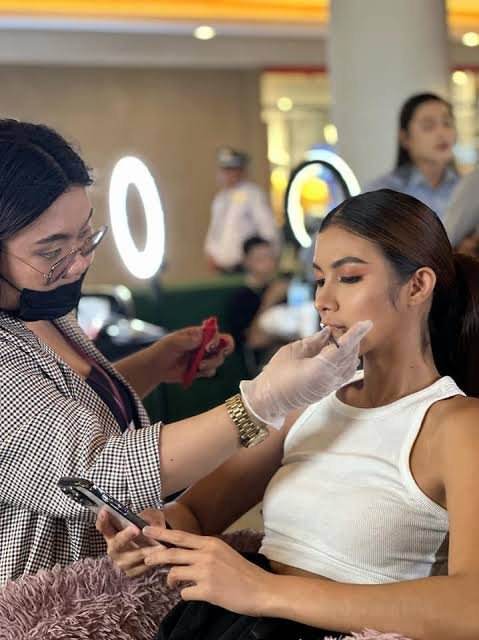What to Look for in a Bridal Hair and Makeup Contract
Introduction
When it comes to wedding planning, finding the right hair and makeup artist is crucial to making you feel beautiful and confident on your big day. However, it’s just as important to ensure you’re protected legally with a well-drafted bridal hair and makeup contract. This document not only clarifies the services being provided but also outlines expectations, pricing, timelines, and what to do if things don’t go as planned.
In Charlotte, NC—a city known for its vibrant arts scene and picturesque wedding venues—many talented hair and makeup artists provide services to brides. However, regardless of the location or artist you choose, having a detailed contract in place will give you peace of mind and avoid any potential misunderstandings.
Here’s a comprehensive guide on what to look for in your bridal hair and makeup contract to ensure a smooth and stress-free experience on your wedding day.
1. Detailed Description of Services
The most important element of any bridal hair and makeup contract is a clear description of the services being provided. This section should list exactly what is included in the package you've selected. Common services that should be outlined include:
Bridal hair and makeup: Clarify whether this includes trial sessions, the day-of styling, and touch-ups.
Bridesmaids' and attendants' hair and makeup: If your bridal party will be receiving services, specify how many people will be included, and whether it’s hair, makeup, or both.
Additional services: Extras like false lashes, airbrush makeup, or hair extensions should be noted if they are included or come with an additional fee.
Make sure to ask for a breakdown of services for each individual who will be getting styled on the wedding day. Some artists offer packages for the entire bridal party, while others charge per person.
Related: Stress-Free Wedding Prep with Blue Waves Bridal Hair and Makeup in Asheville
2. Trial Session Details
Most brides prefer to schedule a trial run of their hair and makeup look before the wedding day to ensure they’re happy with the results. A trial gives you and your stylist a chance to experiment with different looks, colors, and techniques, ensuring the final result will be flawless.
The contract should specify:
Date and location of the trial session: Make sure this information is clearly stated.
Cost of the trial: Sometimes the trial session is included in the overall package price, but it could also come as an extra charge. This should be clarified upfront.
Number of trial sessions: Will you have one trial, or does the package allow for more sessions if adjustments need to be made?
Ensure there is a clear agreement on what happens if you're not satisfied with the results of the trial and whether changes will incur extra fees.
3. Pricing and Payment Terms
A well-drafted bridal hair and makeup contract should contain a clear breakdown of pricing. This section should cover:
Total cost of services: This includes everything, from bridal hair and makeup to the services for your bridal party, any additional extras (such as false lashes or hair extensions), and travel fees.
Deposit amount: Many artists require a deposit to secure your booking. This amount should be clearly stated, along with the due date.
Payment schedule: Is the full amount due before the wedding, or is a portion to be paid on the wedding day? The contract should clearly state when payments are due and how they should be made (cash, credit card, bank transfer, etc.).
Cancellation and refund policy: This section is critical in case you need to cancel or change your wedding plans. Look for details on whether your deposit is refundable and under what circumstances. Some artists offer a partial refund if you cancel far enough in advance, while others may retain the entire deposit.
Understanding the financial obligations in advance will help you avoid surprises and ensure that everyone is on the same page regarding payment.
Related: Why Investing in Professional Makeup with Blue Waves is Worth Every Penny
4. Timeline and Schedule
Timing is everything on your wedding day, and your bridal hair and makeup services need to fit seamlessly into the schedule. Your contract should outline a detailed timeline for when services will begin and end.
Key details include:
Start time and location: This specifies when and where the artist and team will arrive on the wedding day. Whether they’re coming to your venue, home, or a hotel room, the location and start time must be precise to avoid any confusion.
Expected completion time: This is especially important if you have a tight schedule for photos or other pre-wedding events. Ensure there’s enough time allocated for everyone in the bridal party to get styled.
Number of stylists: Depending on the size of your bridal party and the time available, you may need more than one stylist to ensure everything runs smoothly. Confirm how many stylists will be present and their roles.
A well-planned timeline will help everything run efficiently, ensuring you’re ready for your walk down the aisle without feeling rushed.
5. Travel and Accommodation Fees
If your wedding is taking place outside the artist’s usual area, you may be charged additional fees for travel or accommodations. Charlotte, with its scenic mountain venues and rustic locations, often requires vendors to travel to remote areas, so it’s important to address this in the contract.
Check for:
Travel fees: How much will you be charged for mileage or travel time? Is there a flat fee for travel, or is it calculated per mile?
Accommodation fees: If your wedding is at a distant location or requires the artist to stay overnight, you may be responsible for their accommodation. Make sure this is discussed and agreed upon before signing the contract.
6. Backup Plan and Substitutes
Your wedding day is too important to leave anything to chance, which is why your contract should include a contingency plan. Ask your hair and makeup artist what will happen if they are unable to attend due to illness or an emergency.
Key things to look for:
Substitution plan: Will a qualified backup artist be provided if your stylist is unavailable? What are the credentials of that person, and can you meet them in advance?
Refund policy: If a substitute cannot be found, will you receive a full or partial refund?
A backup plan ensures that even in the event of unforeseen circumstances, your wedding day will go off without a hitch.
7. Liability and Insurance
Professional hair and makeup artists should carry liability insurance to protect both themselves and their clients in case of accidents or allergic reactions. Your contract should specify whether the artist is insured and what the policy covers.
This section is particularly important if you or your bridesmaids have sensitive skin, allergies, or specific medical conditions that could be affected by certain beauty products. Ask the artist about their policies on using hypoallergenic or sensitive-skin-friendly products, and make sure those discussions are reflected in the contract.
8. Communication and Contact Information
Finally, your contract should include clear communication guidelines. You need to know how to get in touch with your artist before and on the wedding day.
Look for:
Contact details: Ensure the contract lists the best way to reach your artist, whether it’s via phone, email, or text. This is crucial for last-minute questions or emergencies.
Response time: Ask how long it typically takes for the artist to respond to emails or calls, and make sure this aligns with your expectations.
Point of contact on the wedding day: If the artist has an assistant or team working with them, know who your point of contact will be, especially if multiple people are involved in your bridal party’s styling.
Clear communication ensures that everything runs smoothly in the lead-up to the wedding and on the day itself.
Read Also: 5 Reasons to Trust Blue Waves Bridal for Your Wedding Day Look
Conclusion
A thorough bridal hair and makeup contract is essential to ensure a smooth and stress-free wedding day. By carefully reviewing the details of services, pricing, timelines, and contingency plans, you can protect yourself from unexpected surprises and guarantee that everything goes as planned. In Charlotte, where weddings often take place in remote, scenic locations, addressing travel, timing, and backup plans becomes even more critical.
Working with a professional hair and makeup artist who provides a detailed and transparent contract will give you the confidence that your beauty needs are in expert hands, leaving you free to focus on enjoying your special day.
-
Yes, many artists charge travel fees, especially if the venue is in a remote area. Make sure to ask if travel or accommodation fees apply to your booking.
-
A professional artist should have a backup plan in case of emergencies, which might include sending a qualified substitute or offering a refund. This should be covered in your contract.
-
A good contract will include a description of services, pricing, payment schedule, trial session details, timelines, travel fees, cancellation policy, and backup plans in case of emergencies.



